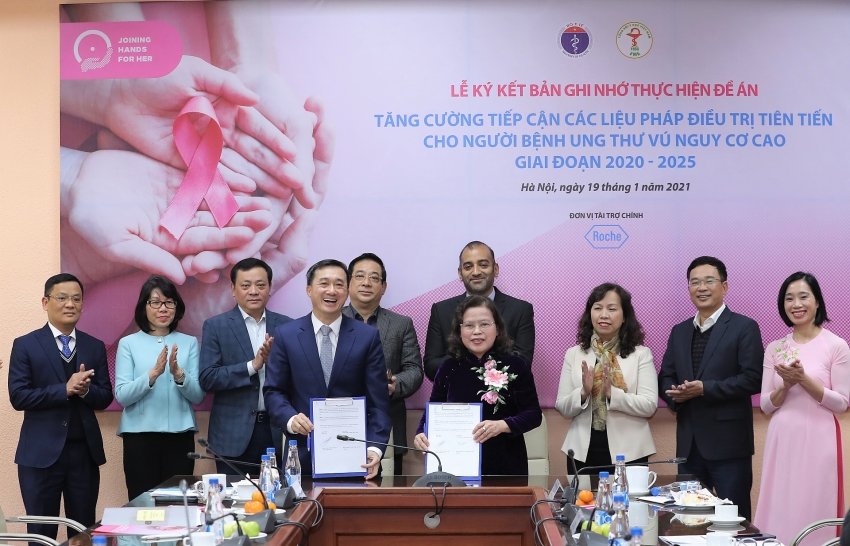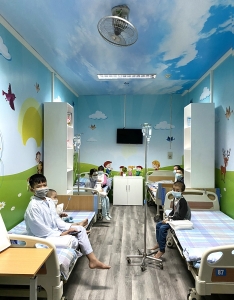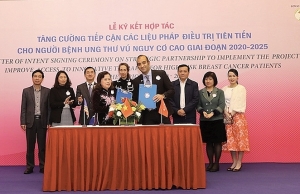Ministry of Health and medical association sign MoU to implement breast cancer project
 |
| The Ministry of Health and Vietnam Medical Association signed the MoU on January 19 |
The signing ceremony was hosted at the Ministry of Health (MoH) and chaired by Prof. Dr. Tran Van Thuan, Deputy Minister of Health, together with representatives from relevant departments and key hospitals.
The Deputy Minister said: “5-10 years ago, over 70 per cent of breast cancer patients visited hospitals and got treated at a late stage. In recent years, thanks to the communication campaigns, especially the national project on the prevention and control of non-communicable diseases including cancer, the rate of cancer patients getting medical examination and treatment in the early stage gradually increases.”
“The implementation of the project will contribute to the overall goal of the National Strategy on the prevention and control of non-communicable diseases, including cancer in 2015-2025. As this project is implemented nationwide with the cooperation between all levels of health departments and agencies, it is expected to bring positive and sustainable changes, leading to the improvement of Vietnam's capability to respond to cancer,” he added.
The project aims to increase the rate of early breast cancer detection among women and improve access to advanced therapies for high-risk breast cancer patients. To achieve this goal, the MoH and Vietnam Medical Association will cooperate on the following areas:
(1) Increasing early detection of breast cancer through raising public awareness, screening for breast cancer, developing policy and professional guidance on breast cancer screening;
(2) Strengthening capabilities of medical system for breast cancer diagnosis and treatment;
(3) Develop real-world data system on breast cancer and optimise current data;
(4) Conduct general research on cost-effectiveness and policy on breast cancer screening status, survey drug use in treatment of high risk breast cancer patients.
This is the first time a specialised breast cancer project implemented nationwide with close-knit cooperation with stakeholders from all levels of government including the MoH, Social Insurance, Vietnam Health Insurance, professional medical agencies, hospitals including K Hospital, Bach Mai Hospital, Ho Chi Minh City Oncology Hospital, Hanoi Oncology Hospital, Cho Ray Hospital and the private sector, with Roche Vietnam playing the role of main sponsor for this project.
This signing ceremony demonstrates strong commitment among the government and healthcare departments to synchronise resources and provide simultaneous solutions to reduce the burden of disease on society.
Girish Mulye, chief representative of Roche Vietnam added: “As a global pioneer in pharmaceuticals and diagnostics, Roche is committed to working with Vietnam to address healthcare challenges through a variety of activities. Roche Vietnam is honoured to accompany Vietnam Medical Association and the MoH in this meaningful project, bringing new hope to breast cancer patients in Vietnam.”
Breast cancer is the top cancer of women in both developed and developing countries. Breast cancer incidence is on the rise in developing countries due to longer life expectancy, rapid urbanisation and changes in lifestyle. According to the Global Cancer Observatory 2020, in Vietnam, breast cancer ranks first among all types of women’s cancer, the number of new cases is 21,555 people, accounting for 25.8 per cent of cancer incidents in both genders, taking third place (after liver and lung cancer). The average age of breast cancer incidence in women is 34.2 per 100,000 people. In both genders, breast cancer mortality rate ranks fourth (with 9,345 cases) after liver cancer, lung cancer, and stomach cancer. The age-standardised mortality rate of breast cancer is 13.8 per 100,000 people.
While certain risks of breast cancer can be reduced through prevention, this strategy cannot eliminate the majority of developing breast cancers in low and middle-income countries, where breast cancer is diagnosed at a very late stage. Therefore, early detection to improve breast cancer treatment outcomes and survival are the cornerstone in controlling breast cancer. At the same time, improving access to innovative therapies is crucial in breast cancer control and management.
What the stars mean:
★ Poor ★ ★ Promising ★★★ Good ★★★★ Very good ★★★★★ Exceptional
Themes: Healthcare Platform
- Hanoi intensifies airport monitoring amid Nipah disease risks
- Cosmetics rules set for overhaul under draft decree
- Policy obstacles being addressed in drug licensing and renewal
- Sanofi, Long Chau Pharmacy relaunch medicine blister pack collection initiative
- Takeda Vietnam awarded for ongoing support of Vietnam’s sustainability efforts
Related Contents
Latest News
More News
- DIGI-TEXX expands footprint with new hub in Ho Chi Minh City (January 30, 2026 | 09:04)
- Vietnamese spend $2.1 billion on food delivery apps in 2025 (January 29, 2026 | 15:14)
- Japan's NTT DATA signs agreement with CMC Global (January 29, 2026 | 15:03)
- Japfa Vietnam hosts annual customer conference (January 29, 2026 | 12:07)
- VietShrimp Asia connecting the aquaculture value chain (January 29, 2026 | 08:00)
- Vietnam among the world’s top 15 trading nations (January 28, 2026 | 17:12)
- Advanced semiconductor testing and packaging plant to become operational in 2027 (January 28, 2026 | 17:10)
- Japanese business outlook in Vietnam turns more optimistic (January 28, 2026 | 09:54)
- Vietnam highlighted in best alternative study abroad destinations (January 27, 2026 | 15:49)
- VIMC targets higher profit and throughput in 2026 (January 26, 2026 | 19:00)





 Tag:
Tag:

























 Mobile Version
Mobile Version